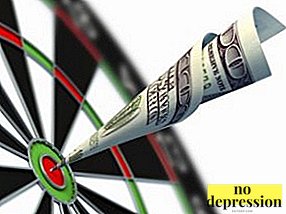Always aim maintain internal balance.
It is a pledge of immunity not only to infectious diseases, but also more insidious diseases.
Is bulimia a disease?

This term is understood mental disorder, causing pathological cravings for food and not having a physiologically justified reason in the form of natural hunger.
During the process of absorption of food in humans, there is indifference to the composition, temperature, quality of food eaten.
One thing is important: chewing apparatus should work, and the rest of the body to perform the necessary manipulations.
That is, the patient, roughly speaking, is stuffed with food, not feeling its taste, not caring about the combination of various products and the consequences that can arise due to the “conflicting” variants of the food eaten.
What is bulimic neurosis?
Stress due inability to resist the call of the stomach, fears of losing shape, an unpleasant feeling due to vainly translated products, fear of succumbing to one's own weakness with witnesses and feeling their contempt or pity, form an additional tension of the nervous system.
Get rid of him the patient can only for a while. Yes, and then in a way that will again lead to new stress - with the help of a foray into a refrigerator or a pantry.
This is how a bulimic neurosis is born, provoked by forced walking in a circleformed from an external oppressive problem, frolicking against its background of dependence, subordination of one's own weakness and feelings about it.

Uncontrolled absorption of food lasts until the body is physically not loses the ability to contain food.
“Having woken up” the snack starts to suffer from a really tangible discomfort arising from overcrowding of the stomach and the pressure of the latter on the adjacent organs.
Natural next body reflex expressed in vomiting, with which the body hopes to survive after unreasonable host behavior.
In a number of cases, it is the one who himself has himself resorted to it, since after an attack of gluttony he quickly growing anxiety about excessive calorie intake, which will soon appear in the form of body fat.
Causes of pathology and what causes it?
The root of suffering lies in unstable psyche and nervous tensioncaused by the current situation in a person’s life or provoked by past events about which a person covertly or clearly experiences.
In an effort to reduce irritability, the patient muffles the discomfort in the soul in a manner suggested by the subconscious.
It captures every single emotion in our life, helpfully retrieves to the surface of memory the encrypted memories of the bliss we experienced while gaining access to the mother's breast or a bottle of food.
This is the connection "Food intake = mental balance", it becomes the desired goal of many who are looking for ways to say goodbye to emotional torments in the most primitive, but effective, in our subconscious, way.

Another factor that prevents them from responding adequately to problems: fear of frank dialogue with oneself and unwillingness to act effectively according to circumstances, the habit of postponing decisions or shifting them to others.
As a result, sticking stress over and over again enters into the habit, from which it is at hand before the development of boulemia.
Factors that can trigger its development
A disease that forces one to seek solace by absorbing incredible amounts of food is pushed as unresolved conflict situations from childhoodso and Problemsthat people have to face in everyday life.
Typical provocateurs:
- Strict educationmaking it difficult to relax even at home.
- Unhealthy eating habits, frolicking, for example, because of a hungry childhood, or the experience of grafting stresses with food, instilled by adults.
- Specific working conditionsobliging to maintain a certain physical form at any cost.
Gymnasts, ballerinas, fashion models are forced every day to resist the gastronomic temptations for the sake of a slim figure.
- Life at gunpoint cameras: Increased media attention and the inability to keep most of their private lives secret from the public, along with problems at work and in the environment, more than once caused celebrities to fall into the paws of the disease.
Types of disease
The classification of bulimia is carried out taking into account the circumstances that helped develop the disease.
- Hereditary. Due to the repetition of the parent installation, there is much more than is required to replenish the energy expended. In some cases this is due to the desire of the body to obtain the necessary substances, which are very few in the “fuel” provided to it. The more useless food is, the greater the volume of food required by the stomach in order to extract at least crumbs of beneficial trace elements, vitamins. Sometimes the “uselessness” of food is due to an endocrine or other disease that interferes with the normal assimilation of food.
- Depressed. A decadent mood may contribute to the development of a pathological appetite, to be its effect or to “peacefully coexist” with the problem.
- Transistor nervous. It develops in inspired people, more often than girls, who have learned from the girlfriends about the “effective” way to eat as much as they like and not get better.
- Emotional. With a heightened perception of external stimuli and prolonged stress, a person cannot achieve relative calm until he has emptied his stomach, at least partially, with the help of vomiting.
- Artificial. Quickly turns into the actual.
A common occurrence for patients professionally engaged in activities in which strict weight requirements.

According to the preferences of methods of exemption from accepted food bulimia is divided into:
- formed by habituation to artificially induced vomiting after each meal;
- caused dependence on laxative drugs, with which the patient sought to prevent the body from assimilating what was eaten;
- provoked pathological enthusiasm for physical activity, helping to speed up the metabolism and burn extra calories.
Symptoms

The main symptom is considered pathological craving for food without reference to external factors, stimulating excellent appetite in ordinary people (PMS, great physical activity, long stay in the cold).
The patient absorbs food in abnormally large quantities, he does not care what he eats and what taste the eaten foods.
In addition to the brutal appetite when bulimia is characteristic:
- Passion for methods that reduce the digestibility of food eaten.
Increased interest in diets against the background of normal or even underweight, vomiting immediately after the onset of insight and awareness of what happened, taking laxatives.
- Attacks shopmania in grocery stores immediately after experiencing stress.
- Periodic raids on fast food for a record long time.
- Systematic painful reactions to weight gain, leading to short periods of strict diets and subsequent mandatory breakdowns in the form of "attacks" on the refrigerator.
Indirect signs:
- change of diet;
- inexplicable "melting" of the finished food;
- frequent visits to the bathroom;
- swelling of the ear glands;
- wounds on the mucous membrane due to frequent contact with gastric juice.
Stages
- Initial. Attacks on the refrigerator are relatively rare, but have already been marked by turning off the consciousness until the stomach is no longer physically able to contain food. Duration up to six months.
- Average. After bouts of overeating, the patient is increasingly using coercive methods of removing the effects of his addiction to food. It can last for several years if the body is initially strong enough and tolerates the consequences of such behavior.
- Heavy. The body is exhausted by violent methods of food removal and the stomach is not able to normally keep it, the patient suffers from severe nausea even after small snacks, indigestion, constipation, problems with the heart, nervous system. In some cases, people begin to resort to alcohol, drugs, trying to stifle unpleasant sensations in the body and seeking to regain the ability to eat without the subsequent rejection of food by the stomach.
Fatal outcome is possible without medical and professional psychological support.

How to understand that you have bulimia?
First signs, helping to suspect in his initial stage of bulimia:
- Any changes in mood cause wild hunger.
- I want to eat away from everyone, everything that comes to the tooth.
- Previously, eating habits have disappeared somewhere, even what has previously caused cramps in the stomach is eaten.
- The idea to use laxatives or induce vomiting after a hearty meal seems like a delightful opportunity to eat whatever you like and in any quantities.
What does this lead to?
Without curing the disease, the following problems occur:
- depression;
- changes in the psyche;
- problems with vision, condition of hair, skin, nails;
- difficult cure diseases;
- anorexia;
- fatality.

What is dangerous for bulimia, if not cured?
- Nervous system disorder and the development of prerequisites, pushing to passion for alcohol, drugs.
- The digestive tract can lose the ability to digest food so much that even medical professional correction will not help it and man will die.
Implications for the body:
- On the part of the psyche: the neurosis develops into depression, which intensifies the pathological desire for food.
- Metabolic processes are deformed and endocrine diseases develop.
- The body can unlearn how to benefit from food and a person dies of hunger.
Detailed description unpleasant effects of bulimia:
- Reduced overall tone, decreased memory.
- The deterioration of the teeth due to discoloration and strength of enamel under the influence of gastric juice.
- Red eyes due to systematic sessions of artificially induced vomiting, resulting in the reloading of blood vessels in the eyeballs.
- Parchment skin, exfoliated nails, hair loss.
- Spasms, heart problems due to potassium deficiency, unstable water-salt balance.
- Violations of the hormonal cycle and the subsequent "joy" in the form of early menopause, diseases due to problems with the endocrine system.

You can see this in the photo of some stars of show business before and after the development of the disease.
Is death from bulimia possible? It may be hard for you to believe, but the disease already has its reclaimed cemetery with victims.
Most often these are girls and women. - “bulimiches”, since it is they who are more inclined to try diets on themselves and to find ways, as they are, and not to get better without much effort.
What to do: which doctor to refer to for diagnosis?
It is possible that the first specialist should be a therapist who pulls out a referral to narrow specialists: psychologist, endocrinologist and nutritionist.
Treatment
How to deal with bulimia? How to treat? Preparations are prescribed for the correction of processes in the nervous system and the suppression of gag reflexes after eating.
Most often, when medication is prescribed such medication:
- Pills Prozac, Fluoxetine, Imizin and others.
The substances in these preparations improve the metabolic processes in the neurons of the brain, due to which the bouts of depression gradually lose their intensity and the person acquires the ability to enjoy life without doping.
- Overcoming the problem will help Zeercal and similar medications that normalize the activity of the digestive system.
What will help to cope with the disease? To beat bulimia independently at home, it is necessary:
- Change the look at the problemswith which there is no opportunity to fight. After all, nervous tension becomes the cause of the development of the habit of seizing stress.
- Start fighting factorsthat can be eliminated. First, it will allow to further reduce the tension of the nervous system. Secondly, the struggle will help to distract from the refrigerator and give strength to resist the call of pathological appetite.
- Adjust the mode of the day and nutrition, moderately addicted to sports and master a new hobby.
- At bedtime, drink small portions of herbal teas with a soothing effect during the daytime. avoid nerve-stimulating beverages.

Prevention
How not to get bulimia?
The best prevention of mental problems is a healthy egoism and attention to personal boundaries, which do not allow outsiders to lower your own self-esteem.
It is better to know in advance how to get bulimia in order to understand when under the influence of the environment you can become its victim.
Myths and facts, the psychology of bulimia:



